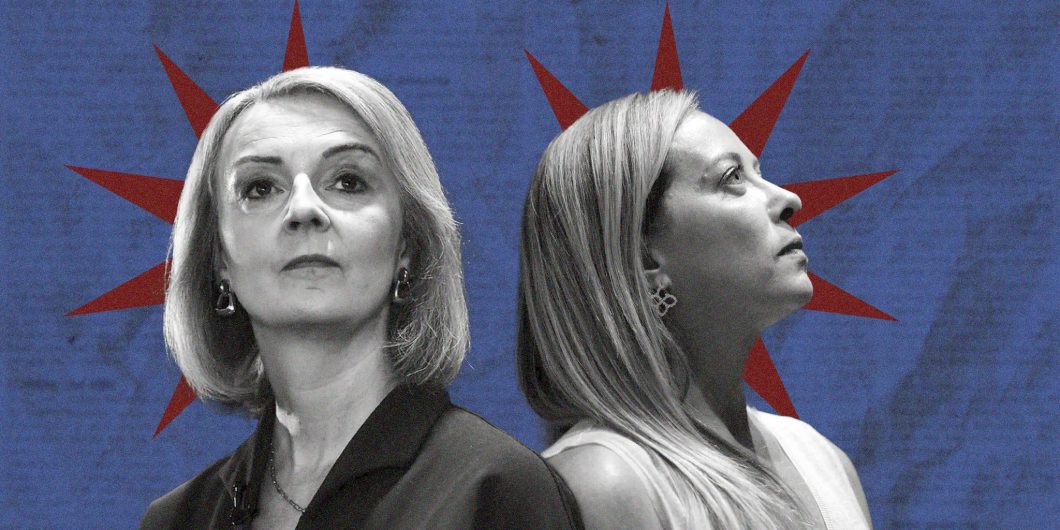The Conservative Party’s immense election victory means it must bind up the wounds the referendum and subsequent polarisation opened in the body politic.
New Avatars for the Right
There is a battle going on across the West about the nature of the right: Should it reflect more of the “right-liberalism of Thatcher and Reagan, or more of the national right, sometimes also called “right illiberalism,” as defined by leaders like Victor Orbán? This fall has seen the selection of two female Prime Ministers—Liz Truss of Great Britain and Giorgia Meloni of Italy—on opposite sides of the divide. Truss is already in office and Meloni will soon be, because she leads the right-wing coalition holding a majority in the Italian parliament. Their success or failure will affect the relative political fortunes of their brand. Their dilemmas illustrate the problems that face both right liberalism and national conservatism today.
Which Way, Modern Conservatives?
Truss is a classical liberal. She won the conservative party nomination by claiming to be the heir of Thatcher. She went so far as to dress like her. She immediately cut the bottom and the top rates of income tax, although under pressure from a rise in interest rates she has reversed her position, at least temporarily, on the top rate. She is committed to deregulation—permitting fracking, curtailing environmental review of infrastructure projects, and cutting the ceiling on bankers’ bonuses to stimulate economic growth. She is opposed to the nanny state, vowing to eliminate a tax on sugar and permitting the importing of fur. Released by Brexit from the strictures of the EU, she is trying to make free trade agreements around the world, although the Biden administration will not make it easy to reach the most important trade agreement of all—that with the United States. Unlike her Conservative Party predecessors, she is even trying to increase immigration in some areas—also to stimulate economic growth. Her agenda contains little conservative social policy. She has even appointed a politician known for her transgender rights activism as Leader of the House of Commons.
In contrast, Meloni’s roots are on the nationalist, corporatist right. Her party is descended from the party which supported Benito Mussolini, although, as Alberto Mingardi has correctly observed, it would be wholly wrong to call her a fascist. While she does have some targeted tax cuts in her program, she is not enthusiastic about deregulation of industries, like taxis, that have traditionally restricted entry. She wants a more interventionist industrial policy to support industries that have not been flourishing. But her economic policy takes a back seat to her social policy. She promises to send out the navy to stop illegal immigration. She wants to discourage abortion and opposes transgenderism.
More generally, she wants to prioritize protecting traditional familial, religious, and national identity, which she sees as threatened by the kind economic liberalism that Truss is intensifying.
In a speech that has been applauded by many conservatives and that has become symbolic of her attachment to the national, populist right, she said:
Why is the family an enemy? Why is the family so frightening? There is a single answer to all these questions. Because it defines us. Because it is our identity. Because everything that defines us is now an enemy for those who would like us to no longer have an identity and to simply be perfect consumer slaves. And so they attack national identity, they attack religious identity, they attack gender identity, attack family identity. . . . Because . . . when I no longer have an identity or roots, then I will be the perfect slave at the mercy of financial speculators. The perfect consumer. . . . We will defend the value of the human being. . . . We will defend God, country and family.
Explaining the Difference
The best explanation of the difference in their programs lies in the divergence of the political traditions of Britain and Italy. Britain has always had a strong tradition of right-liberalism. It begins with important political and economic thinkers, including Adam Smith, David Hume, and John Locke, and continued in the Manchester liberalism of the Whig and then Liberal parties in the nineteenth century. It then took over the Conservative Party during the Thatcher era.
But even among contemporary British conservatives, that tradition does not reign supreme. Truss is the first thoroughgoing right-liberal since Thatcher. David Cameron did not cut taxes and Boris Johnson raised some of them. The latter in fact governed as a “one nation conservative”—a tradition of opposition to right-liberalism that goes back to Benjamin Disraeli. Johnson, for instance, emphasized industrial policy to “level up” the North of England. Thus, a Truss failure is likely to end right-liberalism in the Conservative Party for a generation and return to it to more dirigiste currents that have always contended for primacy.
More economic growth in Italy would allow Meloni to tell off the European Union when it complains about her social policies. Nothing enhances national sovereignty like economic success.
In contrast, the right-liberal tradition in Italy is far weaker. An element of the right there descends from the fascist party, which was socialist in economic outlook. Even the Italian center-right has Christian rather than liberal roots. It has been heavily influenced by Catholic social thought which gives priority to protecting (the generally male) breadwinner even at the expense of a more dynamic economy. To be sure, Italy enjoys a proud intellectual tradition of right-liberalism, now best expressed by the Bruno Leoni Institute, but the political parties on the right espousing liberalism have generally been tiny. Sometimes the left actually does more for deregulation than the right, although only intermittently and even then discouraging economic initiative by building up the welfare state. The absence of a strong right-liberal tradition in Italy has contributed to sluggish economic growth for decades and the worst national debt crisis of any major economy.
Thus, traditionalists do have an important point about the structure of societies. Political philosophies have resonance only insofar as they have been embedded in a nation’s history. Continental Europe has had a stronger feudal order and a more comprehensive religious Catholic worldview mostly unfriendly to economic liberalism, and that old social order still makes a difference today. History also remains relevant to the debate about the nature of the right in the United States. Because the United States was founded on principles much closer to right-liberalism, that strand has unique strength here. Liberalism is a dynamic social philosophy that often upsets traditions, but one of our oldest traditions is right-liberalism.
The Prospects
Truss’s economic program has not been greeted favorably by the markets. The problem is that Britain is running high inflation, and tax cuts in the short term will increase consumption. To be sure, lower taxes and less regulation should, in the long run, encourage investment and increase productivity, boosting growth and reducing inflation. But unlike Thatcher, who had a full five-year parliament, and Reagan, who had the four years allotted a President, Truss must face the electorate in less than two and half years. It is not at all clear she has time to get the economic results needed to win.
And without a program that appeals to social conservatism, including socially conservative views on immigration, it is unclear how she will retain the formerly Labour voters who propelled the Tories to victory in the last election. At that time, the Labour leader made appeals to nationalism and social conservatism unnecessary because he was an extreme left-winger widely regarded as unpatriotic. The current Labour leader, however, wraps himself in the flag at every opportunity the better to portray Truss as an out-of-touch economic elitist.
Meloni’s prospects are also cloudy. The most salient fact about Italy is that it is running an unsustainable public debt, now amounting to 150 percent of GDP—a problem made all the worse by the rise in interest rates. This debt substantially constrains her ability to maneuver. First, she will pay an economic price if she pursues industrial and regulatory policies that would make the economy even more inefficient. Second, she cannot monetize the debt, because Italy does not control its own currency, being a member of the eurozone. Third, she needs further tranches of the EU recovery fund. These subventions are contingent on carrying out economic reforms agreed to by the previous government. Moreover, it gives the EU leverage on social policies that Meloni wants to change, including immigration, abortion, and transgenderism.
Just as Truss would be prudent to adopt some socially conservative policies to broaden her coalition and thereby more effectively pursue her economic liberalism, Meloni would be prudent to adopt more liberal economic policies to give her greater freedom to pursue her social conservatism. More economic growth in Italy would allow her to tell off the European Union when it complains about her social policies. Nothing enhances national sovereignty like economic success.
Moreover, Meloni has not yet developed the slogans that national conservatives have celebrated into coherent policies. It is unclear, for instance, how speculators are a substantial cause of the identity politics she deplores. We have had speculators for centuries in the West without identity politics. Perhaps she can build on the enduring tension between the family and the market. A market backed by the rule of law makes the extended family less necessary for business. It increases trust in making dealing with strangers who may often be more useful and talented than members of one’s own family. A dynamic economy may also force families to reconsider traditions that have helped their cohesion over time. But it is inconceivable that Meloni can succeed by impairing the basics of the market economy that creates dynamism and trust in strangers. They are the foundations of the standard of living on which her citizens rely and on which she will need to build to pay back Italy’s debts.
Advocates of the liberal right would profit from the success of Truss and the failure of Meloni, and the national or illiberal right would gain from the opposite result. But a prospect at least as likely is the failure of both to the benefit of the left.



